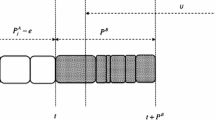Abstract
The Generalized Assignment Problem (GAP) is a well-known operations research model. Given a set of tasks to be assigned to a group of agents and the cost of performing each task by each agent, the model allocates tasks to agents to minimize the total cost subject to the availability of a single resource type. The single resource is consumed by the agents when performing these tasks. In this paper, we add the impact of time to the model assuming that each task has a due date, and inventory cost as well as shortage cost is incurred when a task is finished ahead or after its due date, respectively. We formulate the continuous-time op-timal control model of the problem where identical tasks are grouped into jobs (or batches), each job is performed by each agent with a fixed (production) rate, while due dates are transformed into demand. As a result, analytical properties of the optimal behavior of such a dynamic system are derived. Based on those properties, an efficient time-decomposition procedure is developed to solve the problem.
Similar content being viewed by others
References
F.S. Hillier and G.J. Lieberman, Operations Research, 3rd ed., Holden-Day, 1980.
G.T. Ross and R.M. Soland, A branch and bound algorithm for the Generalized Assignment Problem, Math. Programming 8(1975)91.
R.M. Nauss, An efficient algorithm for the 0–1 knapsack problem, Management Science 23 (1976)27.
S. Martello and P. Toth, An upper bound for the zero–one knapsack problem and branch and bound algorithm, European Journal of Operations Research 1(1977)168.
T.D. Klastorin, An effective subgradient algorithm for the Generalized Assignment Problem, Computers and Operations Research 6(1979)155.
E. Balas and E. Zemel, An algorithm for large zero–one knapsack problems, Operations Research 28(1980)1130.
A. Shtub, L.J. LeBlanc and C. Ziyong, Scheduling programs with repetitive projects: A comparison of a simulated annealing, a genetic and pair-wise swap algorithms, European Journal of Operational Research (to appear).
J.G. Kimemia and S.B. Gershwin, An algorithm for the computer control of a flexible manufacturing system, IEE Transactions 15(1983)353.
E. Khmelnisky, K. Kogan and O. Maimon, A maximum principle based method for scheduling in a flexible manufacturing system, Discrete Events Dynamic Systems 5(1985)343.
J.B. Sousa and F.L. Pereira, A hierarchical framework for the optimal flow control in manufacturing systems, in: Proceedings of the 3rd International Conference on Computer Integrated Manufacturing, IEEE Computer Society Press, Los Alamitos, 1992, p. 278.
Rights and permissions
About this article
Cite this article
Kogan, K., Shtub, A. DGAP - The Dynamic Generalized Assignment Problem. Annals of Operations Research 69, 227–239 (1997). https://doi.org/10.1023/A:1018933012422
Issue Date:
DOI: https://doi.org/10.1023/A:1018933012422



